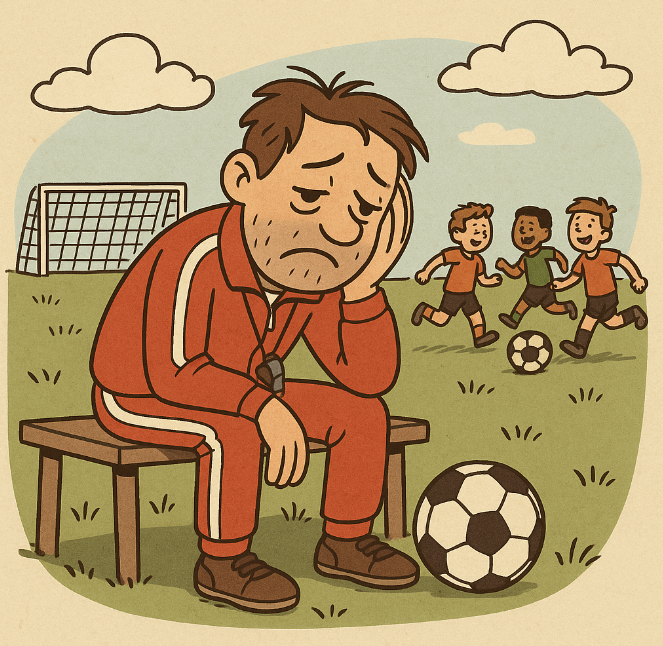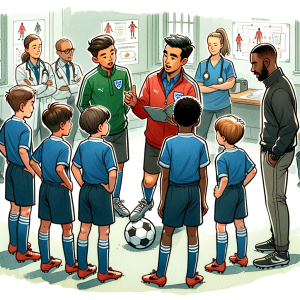
Staying in the Game: Fighting Burnout in Soccer Coaching
Picture this: it’s a Wednesday night, and you’ve already coached two youth sessions this week, with another scheduled for tomorrow. Your players are fired up, but inside, you’re drained. You love the game—but lately, the whistle feels heavier in your hand.
That creeping exhaustion isn’t just “being tired.” It’s a warning sign of burnout—a growing issue in soccer coaching that affects not just performance on the field but also the health of coaches and the development of players.
A recent study, published in Frontiers in Psychology, examined over 400 licensed soccer coaches to understand what predicts burnout and what protects against it. The findings shed light on who’s most at risk, and more importantly, how coaches and clubs can take action.
What the Study Found
The research team analyzed factors like age, coaching experience, education, number of teams coached, and ongoing professional development. Here’s what they discovered:
- Younger and less experienced coaches are more vulnerable. Burnout levels were highest among newer coaches, especially those still grinding for license renewal points.
- Experience and age are protective—but only in the right context. Older, more experienced coaches reported lower burnout if they were motivated by structured professional development. Without that, age alone didn’t make a difference.
- Education matters. Coaches with broader higher education—not just sport-specific degrees—showed more resilience when juggling multiple teams.
- Salary didn’t change much. Surprisingly, being satisfied (or not) with pay didn’t predict burnout levels in this study. That doesn’t mean money isn’t important, but it wasn’t the protective factor researchers expected.
In plain terms: burnout isn’t just about working too much. It’s about whether coaches feel supported, developed, and growing in their role.
Why This Matters for Soccer
A burned-out coach isn’t just personally struggling—they’re less effective at motivating players, managing teams, and building positive club culture. Over time, this can erode player development and increase dropouts, especially in youth soccer where relationships matter most.
Think of burnout like a pulled hamstring: ignore it, and performance will drop across the whole squad. Address it, and you keep everyone in the game longer.
4 Ways to Reduce Burnout in Soccer Coaching
So, how can this research translate into action? Here are four practical takeaways for coaches, directors, and clubs:
- Build mentorship for younger coaches. Pair rookies with experienced mentors. Just like young players need role models, new coaches thrive when guided by veterans who’ve learned to balance pressure.
- Make professional development meaningful. Instead of viewing license points as a box to tick, clubs can integrate workshops, webinars, and cross-team learning that fuel real growth. Coaches motivated by these opportunities are less likely to burn out.
- Value diverse education. Don’t just look at soccer-specific certifications. Coaches with broader backgrounds (education, psychology, business) bring extra resilience and problem-solving skills. Encourage staff to keep learning beyond the pitch.
- Manage workloads smartly. Coaching multiple teams can build burnout, especially for those without advanced qualifications. Clubs should structure staff roles realistically—quality over quantity.
Connecting to the Bigger Picture
Burnout in coaching mirrors the challenges faced by soccer today: rising expectations, limited resources, and the constant pressure for results. It’s also part of a broader global conversation about mental health in sport—from elite professionals managing relentless schedules to grassroots volunteers juggling jobs and late-night practices.
By applying lessons from this study, soccer clubs can not only protect their coaches but also build healthier environments for players and communities. A coach who feels energized, supported, and valued will pass that energy straight to their team.
Your Turn to Kick It Off
Burnout may not always be visible on the scoreboard, but it shapes the future of every club. The research is clear: we need to pay attention.
What do you think?
- How does your club support younger or less experienced coaches?
- Have you found professional development energizing—or just another requirement?
- What changes could help prevent burnout in your coaching staff?
Drop your thoughts in the comments, or share this post with your coaching network to keep the conversation going.



